Keeping Score
Motivators of Money-Seeking Beyond Economics - Money acquisition is driven more by psychological factors than solely economic needs, acting as a proxy for self-esteem and achievement. This psychological underpinning affects decision-making, resulting in behaviors aimed at avoiding failures or regret, and influencing actions around risks and rewards.
Mental Accounting Concepts - Explored by Richard Thaler, mental accounting involves organizing financial decisions into various categories or accounts, shaping spending and saving behavior. These accounts help manage finances with clearer intents, such as savings for emergencies or daily expenses, influencing how readily funds are utilized from each account.
Emotional Reactions and Decision Outcomes - Decisions are often swayed by potential emotional reactions like regret. Actions are evaluated based on emotional costs, leading to biases such as the disposition effect, where investors prefer selling 'winning' stocks to avoid the regret of tangible financial losses associated with 'losing' stocks.
Sunk-Cost Fallacy and Escalation of Commitment - The sunk-cost fallacy describes the continuation of investing in failing projects due to prior investments rather than prospective viability. This often illogical commitment is driven by an unwillingness to admit previous errors, contrasted with decision-making that should focus on future benefits only.
Regret in Decision-Making - Regret, a significant influence on behavior, arises when alternatives to a decision are easily conceivable. People are more likely to experience regret when their actions deviate from what is typical or expected, affecting future decision-making by favoring inaction or default choices to minimize potential regret.
Responsibility and Avoidance of Loss - People exhibit high loss aversion when outcomes possibly lead to them being directly responsible for negative results, such as health risks or financial setbacks. This aversion influences not only personal but also larger organizational and policy decisions, often leading to overly cautious behavior that can hinder beneficial risk-taking.
Influence of Default Options and Risk Management - Default options significantly influence the perception of regret and responsibility. Deviations from default settings are more susceptible to regret, and this tendency can manifest in various scenarios from financial investments to interpersonal actions like social greetings or professional decisions.
Economic Behavior and Mental Accounting Impact - Economic decisions are frequently impacted by mental accounting, where individuals separate and value transactions differently based on subjective mental accounts rather than objective economic logic. This can lead to economically inefficient decisions that favor emotional satisfaction over financial benefit.
Overall Implications for Decision-Making - The chapter emphasizes the complex interplay between economic rationality and psychological factors in decision-making. Understanding these influences can lead to more mindful approaches to financial decisions, policy-making, and personal behavior management.
